VIPsight - November 2010
COMPANIS
Hochtief versus ACS
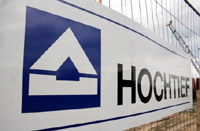 Spanish construction group ACS, currently holding 29.98% of German construction giant Hochtief, is to raise its holding, initially to over 30% and in the immediate term to up to 50%. So far the Spaniards are offering eight ACS shares in exchange for five securities of the MDAX company. This means the offering has a value of €2.7 billion. The Essen company initially made political appeals: Hochtief had to be rescued because ACS had for years been spoon-fed with EU subsidies, meaning German money too. While German chancellor Angela Merkel (CDU) turned this down, the SPD jumped on the wagon and is now calling for the Takeover Act to be amended so that even after the 30% threshold is passed a compulsory bid becomes due if holdings are expanded. Merkel instead offered practical help, mediating talks with Qatar’s Minister for the Economy. The Emirate, speculates Der Spiegel, is to be recruited as an investor, making it a white knight. As a poison pill, Hochtief is also contemplating a capital increase that would dilute the ACS holdings and make it more expensive for ACS to come in. Additionally, the Essen company has asked Australian stock exchange regulators to look into whether ACS ought not to make a bid for the shares of Hochtief’s profitable and valuable subsidiary Leighton, in which the Hochtief holding is 54%. The approach was initially turned down. After Leighton itself asked ACS for a separate bid for 45% of its shares, the decision on this is now before the so-called takeover panel. If this body calls for a compulsory bid for Leighton, the whole takeover would be €3 billion more expensive, so that it would probably collapse. In the meantime, in November the Spaniards are intending to decide a capital increase by up to 50% of share capital, to stock up their war chest. The Federal Institution for financial services oversight (BaFin) has now ordered that a definitive offer by ACS to Hochtief shareholders must be made by the end of January 2011, not before.
Spanish construction group ACS, currently holding 29.98% of German construction giant Hochtief, is to raise its holding, initially to over 30% and in the immediate term to up to 50%. So far the Spaniards are offering eight ACS shares in exchange for five securities of the MDAX company. This means the offering has a value of €2.7 billion. The Essen company initially made political appeals: Hochtief had to be rescued because ACS had for years been spoon-fed with EU subsidies, meaning German money too. While German chancellor Angela Merkel (CDU) turned this down, the SPD jumped on the wagon and is now calling for the Takeover Act to be amended so that even after the 30% threshold is passed a compulsory bid becomes due if holdings are expanded. Merkel instead offered practical help, mediating talks with Qatar’s Minister for the Economy. The Emirate, speculates Der Spiegel, is to be recruited as an investor, making it a white knight. As a poison pill, Hochtief is also contemplating a capital increase that would dilute the ACS holdings and make it more expensive for ACS to come in. Additionally, the Essen company has asked Australian stock exchange regulators to look into whether ACS ought not to make a bid for the shares of Hochtief’s profitable and valuable subsidiary Leighton, in which the Hochtief holding is 54%. The approach was initially turned down. After Leighton itself asked ACS for a separate bid for 45% of its shares, the decision on this is now before the so-called takeover panel. If this body calls for a compulsory bid for Leighton, the whole takeover would be €3 billion more expensive, so that it would probably collapse. In the meantime, in November the Spaniards are intending to decide a capital increase by up to 50% of share capital, to stock up their war chest. The Federal Institution for financial services oversight (BaFin) has now ordered that a definitive offer by ACS to Hochtief shareholders must be made by the end of January 2011, not before.
Accounting errors at Conti
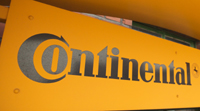 Continental has been criticized by the German accounting panel (DPR) for its valuation of goodwill in its 2008 group report, reported Börsen-Zeitung on 13 October. The error announcement required by BaFin stated that the intrinsic value of the transaction or firm had not at the time been disclosed in its full amount. The ensuing depreciation test led to further write-offs of €876 million in the 2009 group report. In May 2009 the DPR had already begun an audit of the group report and final report, as well as of the group situation report and the situation report for the business year 2008.
Continental has been criticized by the German accounting panel (DPR) for its valuation of goodwill in its 2008 group report, reported Börsen-Zeitung on 13 October. The error announcement required by BaFin stated that the intrinsic value of the transaction or firm had not at the time been disclosed in its full amount. The ensuing depreciation test led to further write-offs of €876 million in the 2009 group report. In May 2009 the DPR had already begun an audit of the group report and final report, as well as of the group situation report and the situation report for the business year 2008.
Buffett builds up
Warren Buffett has built up his holding in Munich Re to 10.244%. As further stated on 19 October, the well-known US investor, while he wants to increase his holding in the world’s biggest reinsurer in coming months, is not seeking any influence. Buffet will in future too stay away from appointments to the administration (board and supervisory board) and from strategic questions. The investment was aimed solely at securing trading profits, not attaining strategic objectives.
Lex Commerzbank
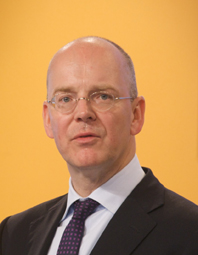 By 2012 at latest, Commerzbank CEO Martin Blessing wants to repay the total of €18.2 billion the government granted the number 2 among German private credit institutions as a financial injection during the crisis. If the Bundestag adopts the Restructuring Act before it on 12 November, the Frankfurt bank could raise the necessary funds through a capital increase, bringing it a big step closer to repayment. The AGM had already agreed in May to build up the capital. Currently the Commerzbank’s share is floundering at around €6, so that a regular capital increase by the statutory regulated maximum of 50% of share capital, i.e. 590 million units, would raise only around €3.7 billion – far less than the €18.2 billion needed. The new act overturns the 50% rule for credit institutions that have to repay state aid. De facto that applies only to Commerzbank. The “Lex Commerzbank” is to be passed by the Bundesrat on 26 November and enter into force in early January 2011.
By 2012 at latest, Commerzbank CEO Martin Blessing wants to repay the total of €18.2 billion the government granted the number 2 among German private credit institutions as a financial injection during the crisis. If the Bundestag adopts the Restructuring Act before it on 12 November, the Frankfurt bank could raise the necessary funds through a capital increase, bringing it a big step closer to repayment. The AGM had already agreed in May to build up the capital. Currently the Commerzbank’s share is floundering at around €6, so that a regular capital increase by the statutory regulated maximum of 50% of share capital, i.e. 590 million units, would raise only around €3.7 billion – far less than the €18.2 billion needed. The new act overturns the 50% rule for credit institutions that have to repay state aid. De facto that applies only to Commerzbank. The “Lex Commerzbank” is to be passed by the Bundesrat on 26 November and enter into force in early January 2011.
Bidding war at Demag Cranes
Demag Cranes would stay independent and expand into emerging economies on its own forces, said Aloysius Rauen, CEO of Düsseldorf crane maker Demag Cranes, to repel the advances by Finnish competitor Konecranes. In September the Finns had already presented the Demag management with a plan for a possible merger of the two cranemakers. Rauen thereupon indicated that talks with interested parties were not in the interest of the company or its stakeholders. He turned down an invitation to Finland in October. Instead, Rauen went on a road show to advocate independence for his company. In parallel, US building-equipment maker Terex also indicated an interest in the Düsseldorf company. The takeover rumors drove the Demag share prize up by over 50% to upwards of €36 per share.
Cheap bid for Postbank
 Deutsche Bank had barely completed a record capital increase by €10.2 billion when as Germany’s biggest private bank it made Deutsche Postbank shareholders a takeover bid. €25 per share, the legal minimum, is what Deutsche Bank CEO Josef Ackermann is still offering free shareholders of the Bonn bank until 24 November. The independent shareholders hold some 31% of the Postbank securitites, and Deutsche Bank around 29.95%. Before the end of this year Ackermann wants to consolidate Postbank, which means taking the 50% hurdle. But resistance is growing among the shareholder defence organizations. By contract, Deutsche Bank has to take over a Postbank share block of 27.4% in 2012 and pay €45 per share for it. European shareholder association Deminor wants to bring in the Federal Institute for financial services oversight (BaFin), and is, along with German investment company Effecten-Spiegel, threatening a lawsuit against the low offer. German investor protectors expect an improvement in the bid and are advising their members to wait.
Deutsche Bank had barely completed a record capital increase by €10.2 billion when as Germany’s biggest private bank it made Deutsche Postbank shareholders a takeover bid. €25 per share, the legal minimum, is what Deutsche Bank CEO Josef Ackermann is still offering free shareholders of the Bonn bank until 24 November. The independent shareholders hold some 31% of the Postbank securitites, and Deutsche Bank around 29.95%. Before the end of this year Ackermann wants to consolidate Postbank, which means taking the 50% hurdle. But resistance is growing among the shareholder defence organizations. By contract, Deutsche Bank has to take over a Postbank share block of 27.4% in 2012 and pay €45 per share for it. European shareholder association Deminor wants to bring in the Federal Institute for financial services oversight (BaFin), and is, along with German investment company Effecten-Spiegel, threatening a lawsuit against the low offer. German investor protectors expect an improvement in the bid and are advising their members to wait.
Puma stumbles in Greece
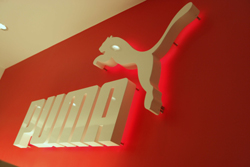 Actually, the figures for the current year were encouraging. Yet sports-goods maker Puma nonetheless had to mix some bitterness in with the figures for the future. The management and the partners in the joint venture Puma Hellas S.A. (Puma share 70%), the Glou brothers, have systematically misappropriated money and defrauded over the years; this was the finding of initial special investigations by auditors. Now the balance sheets for earlier years must be adjusted and a total of €115 million in special write-offs before tax be made. In 2010 alone, the cost of the scandal will amount to €30 million. The figures for 2009 will have to be corrected. In the meantime, a new management had been put in place for Greece. Civil and criminal claims against the minority partners and the former management were being looked into.
Actually, the figures for the current year were encouraging. Yet sports-goods maker Puma nonetheless had to mix some bitterness in with the figures for the future. The management and the partners in the joint venture Puma Hellas S.A. (Puma share 70%), the Glou brothers, have systematically misappropriated money and defrauded over the years; this was the finding of initial special investigations by auditors. Now the balance sheets for earlier years must be adjusted and a total of €115 million in special write-offs before tax be made. In 2010 alone, the cost of the scandal will amount to €30 million. The figures for 2009 will have to be corrected. In the meantime, a new management had been put in place for Greece. Civil and criminal claims against the minority partners and the former management were being looked into.
In the meantime, French luxury goods group PPR is tying Puma, in which it currently holds just over 70%, more tightly into the group. In April 2011 shareholders in the Herzogenaurach firm should agree to a transformation into a European Company (Societas Europaea). Instead of the dual system of supervisory board and executive board there will then be an administrative board able to give instructions to the managing directors. Puma CEO Jochen Zeitz will become the new chair of the administrative board and at the same time head the newly-created sport and lifestyle segment in the PPR structure. Shareholder protectors are critical of these transformation plans.
TUI finds accounting errors
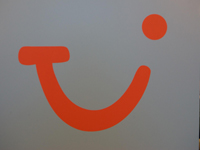 Over several years, accounting errors in the IT system of British TUI subsidiary TUI Travel had accumulated. The mistakes have now been recognized, and TUI Travel has to write off £117 million (€120 million), £88 million of it for the business year 2009/10 that ended in September alone. After the correction, TUI Travel’s balance sheet for the previous year will show a result £42 million down. These value corrections at the British subsidiary will affect its parent in Hanover, which holds 57% of the TUI Travel shares. On the TUI balance sheet for the rump business year 2009, the EBITA for the segment is rated at €45 million. €75 million go to the years before 2009, to be rectified as a balance-sheet correction to the equity capital in 2009. In consequence, TUI Travel CFO Paul Bowtell will be taking off his hat at the end of the year.
Over several years, accounting errors in the IT system of British TUI subsidiary TUI Travel had accumulated. The mistakes have now been recognized, and TUI Travel has to write off £117 million (€120 million), £88 million of it for the business year 2009/10 that ended in September alone. After the correction, TUI Travel’s balance sheet for the previous year will show a result £42 million down. These value corrections at the British subsidiary will affect its parent in Hanover, which holds 57% of the TUI Travel shares. On the TUI balance sheet for the rump business year 2009, the EBITA for the segment is rated at €45 million. €75 million go to the years before 2009, to be rectified as a balance-sheet correction to the equity capital in 2009. In consequence, TUI Travel CFO Paul Bowtell will be taking off his hat at the end of the year.
There is by contrast an upswing at shipowning subsidiary Hapag-Lloyd. After the company had got into difficulties last year, it gave back to the government a €1.2 billion guarantee given at the end of September and never used, and now the whole financing of the Hamburg company can be re-arranged. In the first place, Hapag-Lloyd is to get a syndicated loan of €360 million. Secondly, a bridging loan of €227 million from parent TUI has already been repaid. The ending of the government guarantees will also mean resumption of interest payments to the parent. The fact that investors too have confidence in the shipping line is demonstrated by company loan placed in early October amounting to $700 million, which was raised by €150 million because of the high demand. The refinancing is regarded as a requirement in order to help TUI to get out of Hapag-Lloyd. TUI currently holds 43% of the shares.
DAX companies shut down social networks
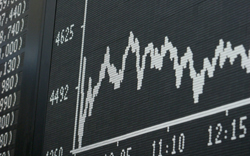 For fear of security gaps and data espionage, some DAX companies are blocking access at workplaces to social networks like Facebook. Popular online services like short-message service Twitter and video portal YouTube are also being blocked, the Wirtschaftswoche reported. As well as fear of economic espionage and data security, the lower productivity of employees played a part too. Experts, however, advise against shutdowns. Employees ought instead to be sensitized, warned Christian Fuchs of security specialists Kaspersky. On the other hand, increasing numbers of companies are using the networks as communications channels, and over two thirds of DAX companies intend not to block them off.
For fear of security gaps and data espionage, some DAX companies are blocking access at workplaces to social networks like Facebook. Popular online services like short-message service Twitter and video portal YouTube are also being blocked, the Wirtschaftswoche reported. As well as fear of economic espionage and data security, the lower productivity of employees played a part too. Experts, however, advise against shutdowns. Employees ought instead to be sensitized, warned Christian Fuchs of security specialists Kaspersky. On the other hand, increasing numbers of companies are using the networks as communications channels, and over two thirds of DAX companies intend not to block them off.















